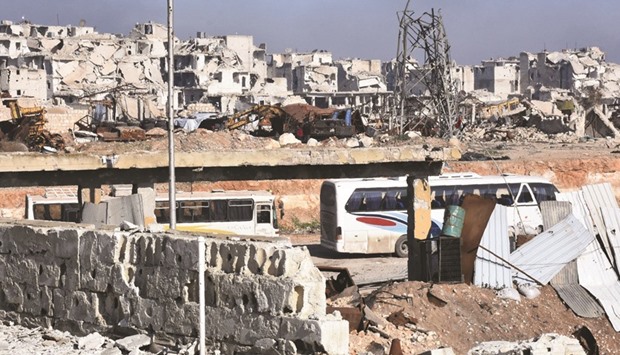Syria’s army yesterday urged the last remaining rebels and civilians to leave the besieged opposition enclave in Aleppo as it prepares to take full control of the devastated city.
The evacuation of Aleppo’s rebel sector is seen as a pivotal moment in the nearly six-year war that has killed more than 310,000 people and triggered a major humanitarian and refugee crisis.
Following a flurry of diplomatic activity, key regime allies Russia and Iran as well as rebel supporter Turkey agreed to act as guarantors in Syria peace talks, Russian Foreign Minister Sergei Lavrov said.
They also backed expanding a ceasefire, according to Lavrov, who said the evacuation of east Aleppo should finish within “one or two days”.
In east Aleppo yesterday, soldiers using megaphones called on the remaining fighters and civilians to exit the opposition districts, a military source said.
“The army is expected to enter (Aleppo) to clean the area after the fighters leave,” the source said.
At least 25,000 people have left rebel districts of Aleppo since the operation began last week, according to the International Committee of the Red Cross, which is overseeing the operation.
Spokeswoman Ingy Sedky said 750 people had been evacuated in parallel from Fuaa and Kafraya, two Shia majority villages in northwest Syria besieged by rebels, as part of the deal.
Ten buses left the battered east yesterday morning, Sedky said.
But no other buses moved the rest of the day, according to the Syrian Observatory for Human Rights and a medical official overseeing evacuations.
Observatory head Rami Abdel Rahman said the delay was due to complications in Fuaa and Kafraya.
Around 20 buses had entered the two villages yesterday but had yet to evacuate anyone, Abdel Rahman said, but he had no details on the reason.
State news agency Sana blamed the “delay in the last batch” of evacuations from Aleppo on “disputes” among rebel groups.
“I’m waiting for my brother to get out of east Aleppo - he’s a 70-year-old civilian,” Nuhad al-Seikh said just outside rebel-held Aleppo.
“I’ve been speaking to him over the cellphone. He said he boarded a bus but is still waiting,” said the 55-year-old.
An AFP correspondent at Khan al-Assal, the staging ground where evacuees from Aleppo, Fuaa and Kafraya were being transferred to their respective destinations, saw hundreds of people aboard eight buses from the two villages.
Bashar Babbour, who works with the medical charity UOSSM, told AFP from Khan al-Assal that evacuees from yesterday morning looked cold and exhausted.
“When people are going to the medical assessment teams, most of them ask for food and water, in addition to blankets, especially if they’re arriving at night,” Babbour said.
He said many other evacuees were also asking if there was Internet access there so they could contact friends or relatives.
The World Health Organisation said the Aleppo evacuees included around 300 needing medical treatment, among them dozens of children.
“The huge majority of these patients have trauma injuries,” spokesman Tarik Jasarevic said, adding that 93 people in critical condition had been referred to hospitals in Turkey.
Aleppo was once Syria’s commercial and industrial hub, but it has been divided since 2012 between government forces in the west and rebels in the east.
Government forces launched an offensive in mid-November to capture the whole city, and had seized more than 90% of the eastern half when the evacuation deal was struck.

Empty buses that are going to be used to evacuate Syrians from eastern Aleppo enter the embattled city through the Ramoussa crossing, on the southern outskirts of Aleppo, yesterday.
